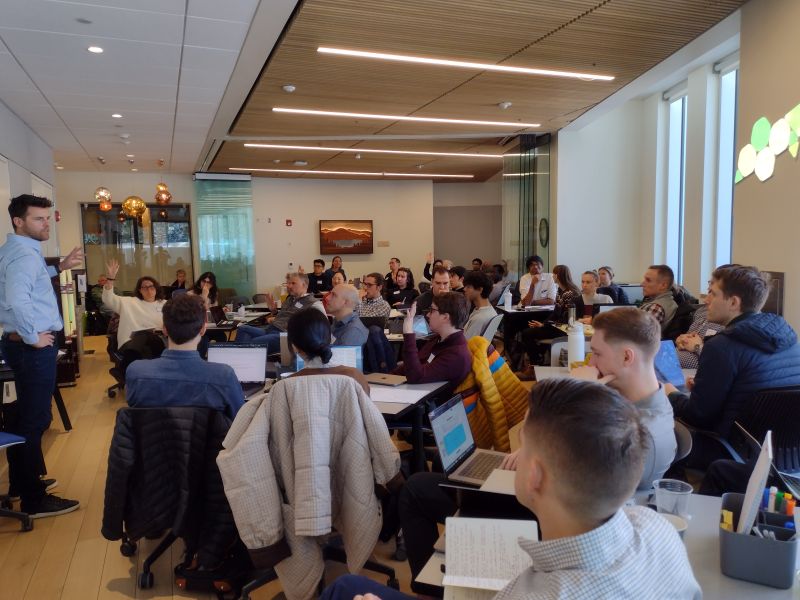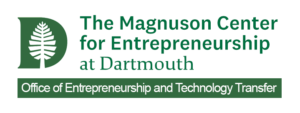Dartmouth Innovation Accelerator for Digital Health Provides Mentorship, Meaningful Funding For Healthcare Innovations
The second cohort of the accelerator is now underway, with 12 participant teams working to bring science-based digital therapeutics and digital health tools to market.

The second cohort of the Dartmouth Innovation Accelerator for Digital Health (DIADH) is currently underway, with 12 participant teams receiving mentorship on entrepreneurship and translating technologies, as they vie for up to $100,000 in funding to advance their projects.
The accelerator, a partnership between the Magnuson Center for Entrepreneurship and the Center for Technology and Behavioral Health (CTBH) aims to foster real-world implementation of novel, clinically validated digital health applications and digital therapeutics. Participants range from undergraduate students to faculty and physicians, all of whom are working to bring their innovations from the lab to the clinic.
“The accelerative gives us a complementary perspective to our research,” said Sarah M. Preum, PhD, Assistant Professor in the Department of Computer Science, Technical Associate Director of the Dartmouth Center for Precision Health and Artificial Intelligence, and Adjunct Faculty member in the Department of Biomedical Data Science at Geisel School of Medicine.
Preum and her team—which includes many of her students—are working to create a more efficient messaging system between patients and doctors, by harnessing artificial intelligence and machine learning. The system could be implemented in patient portals, like the My D-H system used by Dartmouth-Hitchcock, to automatically triage messages and help patients provide more pertinent information to their doctors.
In a typical research setting, Preum and her students would be focused on the technical prowess of the technology, she said. The accelerator has encouraged the team to expand their thinking, considering factors like the value proposition of the technology and who would pay for it.
“We are still in the earlier phases, and it already has had a positive impact,” Preum said.
To guide teams to think with an eye to the marketplace, DIADH utilizes alumni mentors and students from the Tuck School of Business. Savannah Butler, PhD and Tuck Innovation Fellow, was an innovation consultant for Dartmouth College from 2020-2022 and now works as a healthcare strategist and consultant.
After jumping from her dissertation research in immuno-engineering to working in venture capital, she hopes to help the DIADH teams understand how to harness the power of the scientific expertise in a way that is commercially viable and attractive to investors.
“You need to convince investors that what you have is not only going to be successful but also make them money,” she said.
She urges teams to consider many factors, ranging from their target patient population to their desired exit strategy with the technology to navigating the regulatory landscape. Then there are key questions that can be overlooked in the excitement over a good idea—like do the users even want the product?
That’s a question that Kalina Duncheva, D’27, is considering with her DIADH team. Under the leadership of Dr. Brooke T. McLaughlin, a pediatrician at Dartmouth-Hitchcock, the team is developing a playbook to guide parents and caregivers whose children were recently diagnosed with attention-deficit/hyperactivity disorder (ADHD).
“We’re exploring, is there a need for an ADHD playbook app?” Duncheva said.
Duncheva has participated in TuckLAB in the past but said DIADH allows her to see the real-world stakes of her entrepreneurial endeavors even more clearly.
“It’s lovely to feel like what you’re doing can really have an impact bigger than yourself,” she said.
Whether or not this particular project moves forward, Duncheva said she’s learned from the mentorship, programming, and other teams that are involved.
“It’s a very fascinating experience,” she said.
That’s also been the case for Brendan Gibson, Tuck’25, who is working closely with teams as a Tuck mentor to help them consider marketing, pitching, and other business questions around their technology. It’s beneficial not only for the teams, but for Gibson and the other business students, he said.
“We’re getting to actually apply what we’re learning in classes and get some real-world experience,” he said. He’s had to learn how to convey business topics to people who aren’t familiar with the jargon of the business and investing world.
“I’m learning how to teach and be able to communicate those ideas to someone who may not have the same level of knowledge… how to change how you’re saying something but not what you’re saying,” he said.
Gibson, who worked as a physical therapist before enrolling at Tuck, has enjoyed the DIADH programming, including speakers from the healthcare entrepreneurial space.
“It’s an opportunity to hear more professionals talk about the way they’ve solved problems—something I can never get enough of,” he said.
Dr. Alexander T. Abess, Assistant Professor of Anesthesiology at Geisel, is director of the IDEA Lab, which seeks to foster innovation in the healthcare space at Dartmouth-Hitchcock and beyond. He’s participating in DIADH with two teams of from the lab. Although he has ample experience bringing biotech innovation to life, he said that the interdisciplinary ecosystem that DIADH creates is particularly beneficial.
“The accelerator is actively bringing together people from the basic sciences and clinical sciences background, as well as Tuck and Thayer,” he said.
The substantial amount of funding available to teams can provide critical early support, allowing innovators to de-risk an endeavor in order to pursue more substantial funding from the National Institutes of Health or investors.
“Until you get funding from investors or the NIH, it’s hard to make this move from what I jokingly call the science project experiment stage to a potentially viable solution,” he said.
“That’s where this funding is super key. The scale of the funding is notable, and that’s why you see a high caliber of people and projects.”

